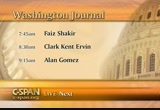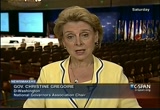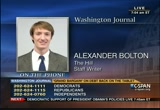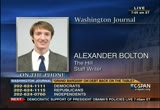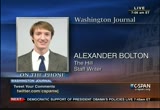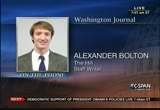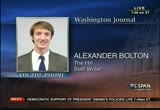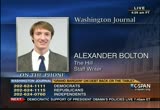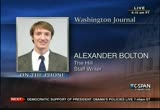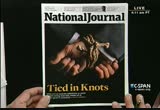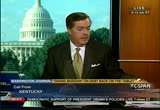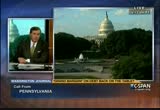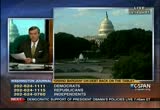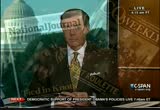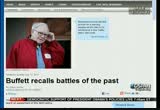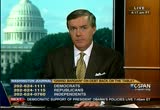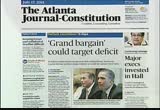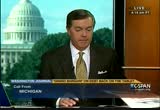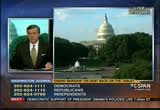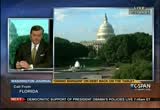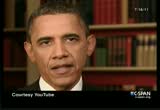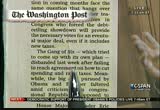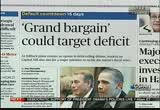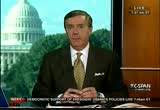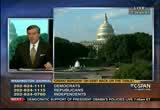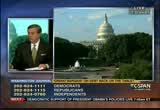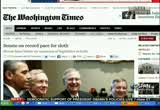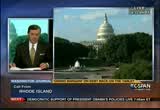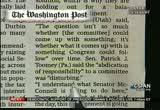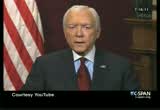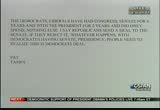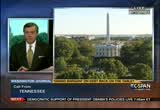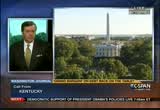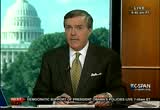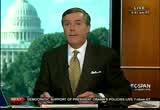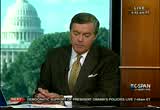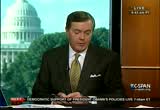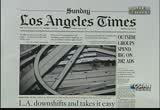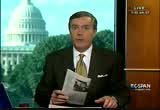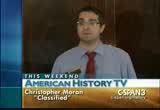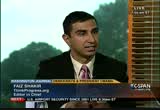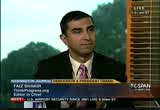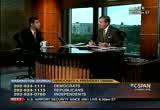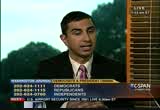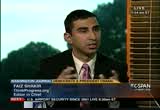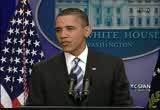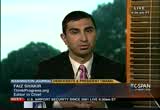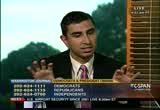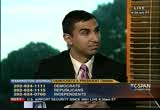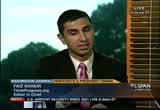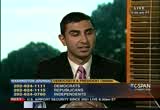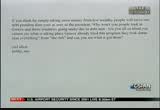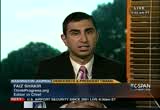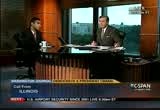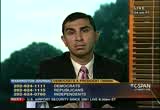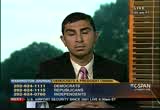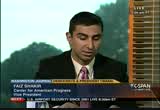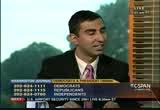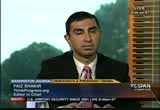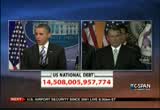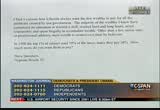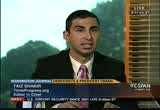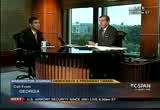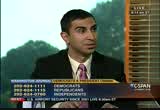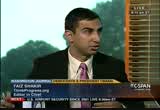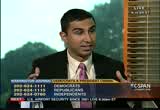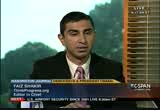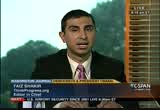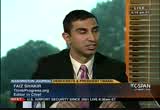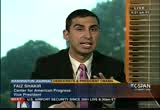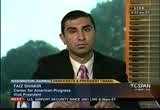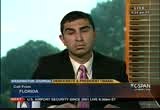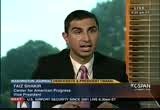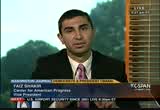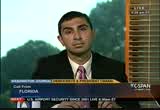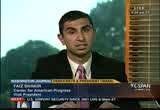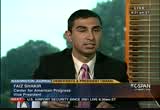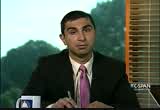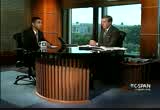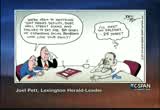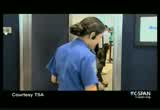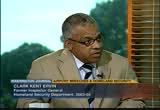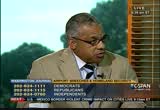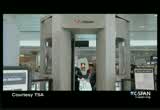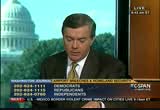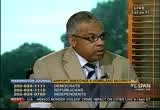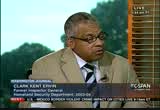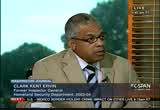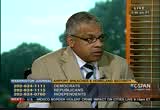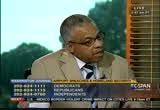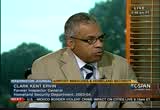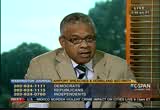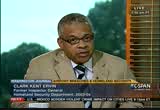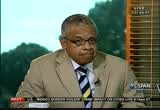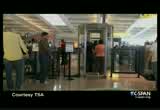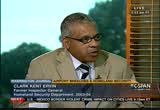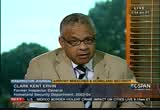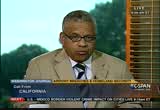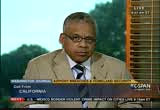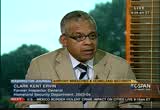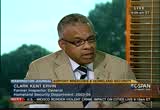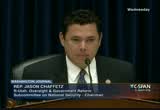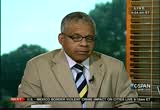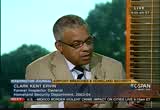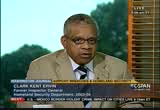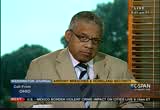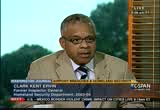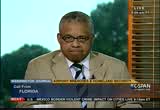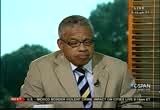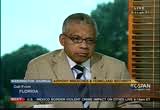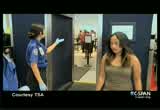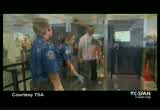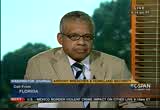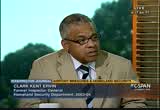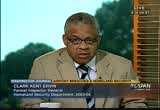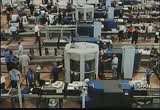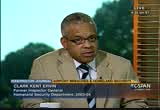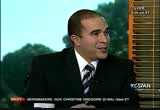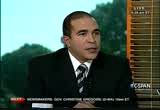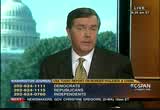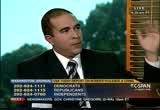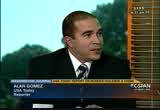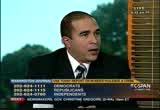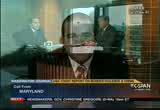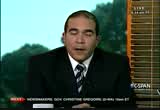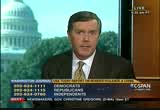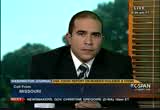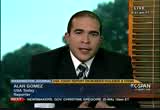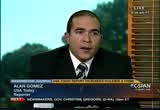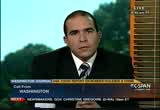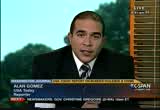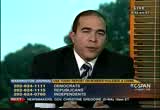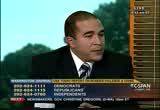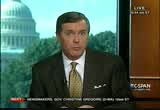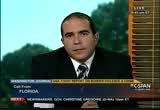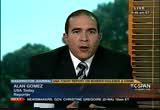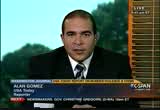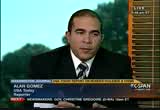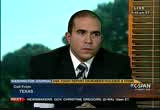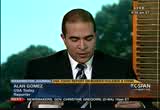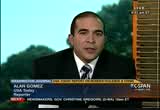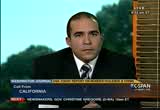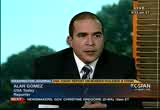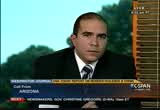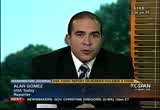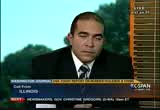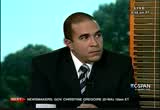tv Washington Journal CSPAN July 17, 2011 7:00am-10:00am EDT
7:00 am
7:01 am
(202) 737-0002 and (202) 737-0001 for republicans and if your independent. the number is inigue(202) 628-0. nations governors getting to in salt lake city and we'll hear what kristen gregoire thinks about this impacting the states. front page of the "washington post". gloria who we have used to get the latest on this. coright leaders press for a deal. as part of the deal to raise the debt limits. leaders on capitol hill form a powerful congressional committee to draw up a new grand bargain by the end of the year. key elements remain in place and the president is clear he wants one and makes the case for skeptical fashions that getting nations fiscal house is in their
7:02 am
best interest and john baner remains to a plan and he did not want to become speaker to do small things. there's a related story on how this impacts the states including here in maryland. the debt crisis would hurt maryland and the loss of a steady paycheck is becoming a routine for frank silver stein. who is a union steward for the american fedication of government employees. he's said that the pitch battle over to whether race the 14 trillion dollar debt ceiling for this year has put federal workers on edge whether or not they'll have a job in the couple of weeks. here's more from kristen gregoire. the chair on how all of this impacting states around the nation.
7:03 am
guest: the biggest concern is longer this is delayed and the more in action that we see happening out of washington d.c., the more concern that causes in our own economies and our states. i'm a sales tax state so consumer confidence and business confidence is key to my economy so. you can imagine my consumer confidence is down i'm not getting revenue and it's hurting the government. i know i'm seeing good signs in the business community but a number of them have not been willing to hire simply because of the uncertainty in d.c. that really is a direct impact on the states and it's not just my state. >> between while. by the way, kristen gregoire is a guest and you can watch this on news makers. 3 o'clock for the west coast viewers.
7:04 am
the sunday review. we're spent talking about what governor gregoire was talking about. ask the penny-pinching consumer. alex is joining us live on the phone. thanks for being with us. guest: thanks for having me. host: 36 hour deadline by friday from the president came and went although we're told over the weekend. staff level negotiations have continued. what's the later? guest: well, the late zest the highest level talks between the president and the congressional leaders has simmered down. that's everythinged by the fact that the senate republican leader is in kentucky this weekend. the focus is really right now between president obama and the house gop leaders. that's the main impasse in the
7:05 am
negotiations and there was no progress to report yesterday. some democratic aids on friday predicted that there might be a meeting schedule today but there's been no meeting announced yet. so it seems that highest level talks between obama and the congressional leaders and republicans in the house and senate have pretty much wound down and now the focus i think is in the senate moving the mitch mcconnell contingency plan and in the house, the focus is moving what consumers are rallying around the cup, cap and balance plan. >> that's the latest that includes be bait over a balanced budget amendment. who's behind this proposal and what is it calling for? guest: well this proposal has been pushed by conservatives in the house and senate by an array
7:06 am
of conservative grass roots groups or grass types groups depending on your opinion of them. the conservative groups have pushed this cut, cap and balance bill very aggressively. there's a large coalition that have been urging lawmakers in the house and senate to sign a pledge promise together impose any increase unless this cut, cap and balance bill is passed. what it would do is cut about 111,000,000 in bending in fiscal year 2012 and impose and a cap on federal spending capping spending at 18 percent of gross domestic product by 2021 and require the passage of a balanced budget amendment before the debt ceiling is raised.
7:07 am
if that's met it would raise it by 2.4 trillion dollars. consumers think this is their great opportunity to pass this but it seems very unlikely to pass in the senate. >> so walk us through what will happen this week? the house could vote on this as early as tuesday and also senator mitch mcconnell putting pressure on harry reid as well. guest: yeah. well, i think the word now is that there would be a vote on tuesday on the cut, cap and balance bill. and then the fight would move to the senate. mitch mcconnell is moving for both the cut on the cut cap and balance bill and the amendment and that's something he's negotiated with harry reid right
7:08 am
now. it's tough to get two major things done in a single week but giving the looming august second and the conservatives want on both issues maybe they'll be able to game or jam that in. may want to first vote on the cut cap and balance pledge they feel will give the amendment more momentum but tough because you need 2/3 support of both chambers so in the senate you need 20 democrats. host: lots of focus on moodies and the credit rating of the u.s. economies and treasuries. could see action wall street if congress doesn't act on all of this. how much pressure is that putting on members of congress? host: well, the notable development last week is you had
7:09 am
a coalition as major business groups, groups that have been long-time allies of the republican party. u.s. chamber. business roundtable. financial services round table and national services of manufacturers they sent a letter to members of congress last week urging them to put politic as side and get a deal done and that's put pressure on republicans. some of the conservatives in the house have made the argument that a default would not be such a catastrophe. some senate conservatives made that argument too that this deal does not need to get done by august second and the federal government can rearrange spending priorities to continue paying bondholders but the business community was clear that was not an acceptable option and the business community came out with that
7:10 am
letter tuesday morning and tuesday afternoon. mitch mcconnell held a press-conference and rolled out the contingency fall plan and said i'm not going to allow a default to happen so there's certainly been pressure from the business community having an effect on republicans. >> so when you see the outlook station. what happens to the nation if there's no debt deal. america by default you're saying default is not going to happen? guest: well, mitch mcconnell said he will not allow default to happen but i mean, way congress works is one person doesn't have a complete say. i think it's expected to see a number of tea parties and may see some of that happen in the senate to. expectations is you'll have democrats making from the lot of
7:11 am
lost votes but whether or not that'll happen you can't say for sure. given mcconnell's strong statement last week the republican would co-own a bad economy. i think that's a pretty reassuring indication that republican leaders will not allowed the default to happen on august second. >> alex bolten. his work available on the hill.com. we appreciate your time this sunday morning. we'll get to your calls and comments. can send us a tweet. twitter.com/c-spanwj or send an e-mail. journal at c-span.org. debt roulette. congress has the power of the purse but is the debt limit too hot in politicians to handle. why is it so hard to reach a debt ceiling deal all of them agree is see enforcementle and
7:12 am
this from the weekly standard. poles playing poker by from the editorial by jim crystal. a tedious game of dorm room poker. barack obama is the dealer sand enjoying game and not as good as he thinks he is. witness his comments to erik canter. don't call my bluff. which suggests the president doesn't know it's a bad idea to your opponent your bluffing. still the president has the advantage over the republicans and congressional leader host are playing weak hands weakly. from our twitter page. john has this comment saying president obama railed against the debt sealing in the senate which obama do the liberals love. cynthia. democrat line. kentucky. good morning.
7:13 am
caller: good morning. i'm calling because i want the brand bar bane back on the table and republicans to deal in good faith. we need revenues raised. i also want to bring to your attention the whole world is blaming the republican party for what they're doing. the whole world says that is calling them maniacs. and we need to do this because if we don't raise the debt ceiling, the whole world is going to be effected by this and the republicans are acting in bad faith and they need to straighten up and to what's right. host: thanks for the call. stephanie. this idea of a grand bargain is now reportedly back on the table. the "washington post" front page story also available on-line. what's your take? caller: i'm waiting for tom co
7:14 am
burn who is supposed to someone that. it's worth 9 trillion dollars but i don't think it's any problem at all. everyone knows medicare patients and people wanted medicare people. but everyone knows there's so much waste in fraud and abuse. i think a three trillion can come out of that and the military spending without a problem and i think the doctors are the biggest budgets and they're the ones who the republican are always saying the small family business. who do you think a small family businesses are that are earning over $150,000. it's the doctors. it's the doctors and being an independent and former democrat i do like the balance budget amendment and i don't see why the democrat are against it. they're cleaning up the messes from the government. they should be exactly for the
7:15 am
balanced budget amendment. >> john on the phone from florida. good morning. >> i've been a bond trader for about 30-years. and every friday. we have a little pow-wow after work and we talk about the market and about bond trading. and all of this together, don't think that they should raise the debt ceiling. we think that if the government was to default. and they lowered the debt rating from triple-a to double-a or single-a. it would free up a lot of money that has to go into endowments and trust. they could go in the corporate market and it's really done the right thing. they've cut cost and raised
7:16 am
productions and they've done all the right things and they're the ones that are going to create the job. not the government and if we could get the ratings on the government bonds down to where they're competing with corporate bonds i think it would workout a lot better. thank you. >> thanks for the call. bloomberg has this story. dealing with warren buffet. available at bloomberg.com. indicated if a solution is at and and the government misses saying that burg share hathaway and inc. would be willing to pay it's next quarterly income tax early. bushing shire paid about 5.6 billion incorporate taxes in 2010 to a quarterly payment would average about a billion dollars in a c nbc interview the biggest nation's long-term problem rising healthcare costs
7:17 am
and other time the best investment is not in a bunch of railroad equipment or planes and we have a tax code that reflects that. more for the interview on-line. story from bloomberg news and interview at cnbc.com. caller: good morning. i'm glad to see the grand bargain on the debt is back on the table. i think it's the most reasonable and fairway to get the deficit and the debt down. as well as the raising of revenue. i don't want to put the blame on anybody but all of them there are elected officials and they need to get very serious because default is not a question. but the man that called earlier. default will be catastrophic not only to the world but to the
7:18 am
people in this country. what happens to the people that depend on this. the military young men and woman fighting are not supposed to get paid. this is totallyly dick laws. compromise they act like is a terrible word. they need to compromise you can't have one way and not have another. they can't cut, you cut you gut completely the government. anything comes along like hurricanes or floods. who do they call on as federal government. you need them and that's why it was established so everyone needs to get to the table and give a little bit so we don't have to default and don't send this country into a depression. i don't want to see that. host: a reprint of the "washington post" story. grand bargain could target the deficit pointing out key
7:19 am
elements for a big deal remain in place. president is clear he wants one to make the case of skeptical factions of his own party. that word grand in this national you journal piece. an account of phenomenal perfect micro krazle of deficit reduction and tax reforms and energy, immigration and transportation. the story also says the overall debate over this for deficit reduction proves the point. this is only one of the latest examples of how hard it is in reseent years to reenact from both sides. marcus from michigan. independent line. good morning.
7:20 am
caller: good morning c-span and america. host: good morning. go ahead. caller: this grand bargaining is more like grandstanding we don't have a spending or revenue problem we have a thecht problem. trillions of dollars are being stolen from the american public. the american tax pay y payer. it's not just democrat or republicans they're stealing trillions both and they're blaming it on war and all these things when it's them that are steeling the money and the elite. the elite bankers they're working with them and stealing america blind and driving us into over the cliff. and trying to make it look like they're trying help the american people when they're actually
7:21 am
helping themselves. host lost mark. why is the president and democrats afraid of republicans and their plan to balance the budget because they cannot stop spending. the issue is a grand bargain. back on the table. next is democratic caller from florida. al welcome to the conversation. caller: good morning. i would like to ask, i don't understand why the republicans are to afraid of revenue. raising revenue. underize energy hower, he paid off that humongous debt by having a high tax rate of 91% on individuals. and they had full employment and a wonderful economy and we'll, well so high taxes does not destroy jobs blike the republicans say.
7:22 am
high they can't negotiate on e three or four. >> the president using word compromise saying it's time for democrats and republicans to work together to get this done. this followed two news conferences monday and friday this past week and five days of negotiations that began sunday and wrapped on thursday. no session on friday remains unclear what the schedule will be like if he sits down with congressional leaders at the white house in the weekly addresst president talking about more of this. here's more from the president from yesterday. >> simply put. balanced approach, shared sacrifice and willingness to make unpopular choice. that means spending less on domestic and defense programs and reforming programs like medicare to reduce costs and strengthen the program for future generations and it means
7:23 am
taking on the tax code and cutting out certain tax breaks and deductions for the wealth yes americans. some of these things don't make folks in my party too happy. we're not in a better fiscal situation and i'm willing to compromise and do what it takes to solve this problem even if it's not politically popular and i expect leaders in congress to show that same willingness to compromise. k host: first the front page of the "washington post". hopes are reviveed for grand bargain on the debt plan. laurie montgomery saying hopes for a grand resolution face the same question that hangs over the current crisis. tea parties forced the debt ceiling showdown will provide the necessary votes for eventual major deal even if it in clueds new taxes gang of six including
7:24 am
the six senators involved disbanded last week after failing to reach agreements on how to cut spending and raise taxes. meanwhile the big deal pro accused by the president. amid's criticism opposed to an additional revenue. from the "new york times" gop says debt concerns them more than re-election. one fact in the story from robert per. the sheer size of debt as rapid growth have been bold in the house. preempting some of them to pledge not to vote for a higher debt ceiling even a compromise can be reached when the u.s. treasury saying it capped out. since the president took office in january of 2009 during the send. the total federal debt energy including the government has increased 35 percent. while the debt has exploded the
7:25 am
economy has remained stagnant and the debt shared in thegpd has also increased. that's from the jump page of the "new york times" also on-line. we'll get next to, ty from kentucky. good morning. caller: good morning. and thank you c-span for offering the citizen of american a platform. i have a million things to say to o to feel free to cut me off. my name is,dy. i'm not a republican or democrat and nor will i ever be. it's 2011 you have instant information at your fingertips why can't we make optimal decisions why do we have to be on one side of the offense or the other. as far as 14 and a half trillion debt that's a laughable point at
7:26 am
this moment and it's sad that most 22-year-olds can't grasped a put their minds around that number. it's too large of a number for context. basically the raising of the debt limit is similar to this. it's like calling your credit card company and ask for your limits to be raised just in order for you to make that minimum monthly payment for the next month. it's sad. unfortunate and mitch mcconnell is from my state but it's ignorant for a republican to say that we absolutely cannot raise taxes. how can we not raise taxes as we see that wonderful debt clock raise at astronomical. from a democrat standpoint how can you say we need to or enlarge government programs when that's our tax dollars being taken away for you to utilize it in whatever way you see best fit.
7:27 am
it's crazy and absurd for us to d be either. i'll run for president some time so vote for me, ty. host: tried to put all this in perspective. it's full page. a mountain of debt. who owns the 14 trillion dollars in the u.s. national debt? well the debt that the government owes is 5.7 trillion. foreign investors about 4.4 trillion and domestic about 3.9 trillion so who do we owe? china is one. japan. taiwan. russia, hong kong. britain. twit ser land and luxembourg. our mountain of debt for the
7:28 am
u.s. economy from the business section today. bert from spring borrow ohio. grand bargain. everything back on the table is now back on the front page of the "washington post" this morning? caller: i don't agree with them, with any of the way they're coming up with those ideas. either tax the wealthy or cut government programs. why do they need to do either or? you have a lot of government employees. we're the ones why can't you cut their hours like a regular business would do. these people get sick paid days and all kind of benefits. just cut some of their hours and let's get some of that revenue back going. what's wrong with working half day fridays and just start you know, saving some taxpayers some
7:29 am
money? i don't understand it. i didn't vote for any of these people to make tough decisions. i voted for them to make smart decisions. host: thanks for the call. twitter page. the president put anything on the table. republicans are pushing american poor to the brink. crystal on the democrat line. virginia. good morning. caller: hello? host: good morning crystal from virginia beach. caller: hello? okay. my first thing first is nobody is addressing the north american trade agreement that's one of the things i've been looking at on the democrat. [inaudible] handicapping the
7:30 am
united states children. how are we supposed to compete and in a 24-hours. economy with our [inaudible] constantly hearing the we at the united states senate need to educate ourselves and under what the words mean. [inaudible] a lot will vote on the color of the man's skin. this is sad. china is taking over [inaudible] we're going to be a communeistic country. if you owe. i can't get the words out i'm so disappointed i guess but as long as you vote someone you're
7:31 am
always going to be and we're - that's all my remarks for today. ho host thanks for the call. january said all i know is we've been doing the same thing for 10-years and nothing has changed. how about trying something new. stephen keeps track of the u.s. senate and has a piece available on-line at "washington post".com. the headline is senate is on record and plays for loss. big issues are piling up in congress and halfway through this year the senate is on pace for the least productive legislative session and the house is also operating at a clip well below normal. stephen going on to say congressional analysts saying action are regularly stalls when power stopped but this year low pays particularly in the senate is low even by a standard of a low divided government. the chamber has passed fewest
7:32 am
bills since 1947. the senate has a massed the second fewest total number in the record. measure of floor action and notched the fewest. one senator called it galatial and canceld to work on debt reduction only to hold two meaningless votes and then adjourn early. read more from stephen at washington times.com. next is tim on the line. caller: thank you. host: tuning in the idea of grand bargain is back on the table is what we're asking viewers. caller: thanks sir. i'll make it quick. first i have a problem with the phrase grand bargain attaching a gimmicky phrase instead of
7:33 am
talking about what the government has to do to meet the phrase. distracting gimmicky phrase. secondly the republicans are dealing in toxic bad faith. two quick points about that. reenforcemently mitch mcconnell was quoted saying he would not help obama win the election. i think that's borderline treason. he is just saying he's going to under mine the president. destroy him at all costs from mcconnell and baner and the other gop have no conception of the public good. mcconnell wants to raise the debt limit. pardon me. sorry about that. he said he wants to give obama power to raise the debt limit so that way republicans can wash their hands of making up the tough decision. nothing will get
7:34 am
done because the gop is once again dealing in tax ichobad faith willing to take the country to the edge for political points to win next election and people have to get down to basic fact that basically it takes men of good will in dealing in good faith to get anything done and that's the real worry here. host: thanks for the comment. with his poodle in and talking about the grand bargain. front page and on the jump page. two conservative senate saying they're high i doubtful they can produce a real solution. the committee where everything is on the you table. mike from utah saying it's use less. would produce a real solution. which is high they are holding a
7:35 am
balance budget amendment. it's whether what comes up with it's something couldn't follow. they're answer is to cut cap and balance. passing a balanced budget amendment to cap budget spending. 18 percent of the gross domestic spending product. we the see the house vote on think tht this as early as tuesday. pouching harry reid to have a floor vote in the senate. warren hatch. republican of utah is delivering the republican response and took aim at the president on the growing deficit. >> we've been down this road before and republicans will not go down it again. in 1990. congress and the president struck a deficit destruction
7:36 am
with tax increases unfortunately while the tax hikes remain the spending restraint did not and our debt is only marched higher. the solution to a spending crisis is not tax increases yet washington consistently demonstrated it cannot control it's urge to spend and that's why the only long-term solution is a balanced budget amendment to the constitution. only by restoring it on the ability of congress to spend can we restrain the growth of the federal government. >> senator hatch with republican response to the weekly a. judy from louisville kentucky saying might i remind that massive tax increases as part of obama care. can't they wait a year and have all the money they want. also from pat from florida. the democrats and liberals have had congress with the president
7:37 am
for two years and only spent nothing else i say the republicans set a deal to the senate if they reject it people need to realize this is still a democrat deal and finally this from a viewer that did not leave his or her name. good morning steve. nobody mentioned multiple wars and this is where the money is going. our government will cut programs for the poor and the aged. shane is joining us republican line melbourne, florida. idea of to an grand bargain. what do you think, shane? >> back on the table. we should be open to all options. >> va joining us from tennessee. >> thank you. go ahead grace. i think that we should give consideration to anything that help to save our country. however, i do not understand why
7:38 am
is it that people do not understand that this is debt that's been incurred. we're not raising the debt ceiling in order to make new charges this amount of money, amount of charges have already been incurred. >> thanks for the call. independent line. ed from fort campbell kentucky. caller: good morning. as always good to see you. the question you ask about this grand bargain. i believe this thing from the beginning has been nothing more than a sham. and the reason i say that i guess my answer was got several days ago. as far as raising the debt ceiling it's a for gone conclusion it's going to be raised and it becomes clear when the people on wall street came out and said that the debt ceiling. if they weren't scared they were going to get hard in the pocket book they would have never made
7:39 am
that type of public statement i don't believe. i think what this whole thing is about. we're headed for a very deeper recession. and this foreclosure i think will gain momentum and start hitting really hard in the business community. so that's what i think really going on and that therefore is why i call it sham. some people may say a lie and if that's true i do know this for a fact a lie travels faster or further than an eagle flies while the truth lags behind. never quite catching up and i believe that's what we're saying. thank you steve. host: if you're just joining us. front page of the "washington post". even as president obama focus to lift the nation's debt ceiling. top democrats come up with a new way to craft the same sort of deficit cutting plan they
7:40 am
abandoned last week. as part of the deal to raise. leaders on capital hill are forming a powerful congressional committee charged withdrawing up a new bargain by the end of the year. it's come up with reference to tax increases or revenue increases and spending cuts. next call is michael joining us on the republican line from florida. welcome. michael. >> hi steve. good morning. thanks for c-span. the biggest problem i have is how do you compromise with a man whom only two years ago said himself that you don't raise taxes in a recession? i guess if that's what you want to call what we're in. i'd like to call it more of a depression than anything. host: obama's prospects tied to a debt deal. his chances for re-election and reheard a figure in access of
7:41 am
$80 million raised by the president in the second quarter for the democratic committee and this story from the "new york times". new sfabl of wealthy donors. 31 of these so-called collected excess of $500 thousand each in contribution to the campaign. including two hedge fund managers listed here and a wealthy pure torilawyer and oth include a post friend and consultant to steven spielberg and the e editor of vogue. the party establishment have been front and center in contributing to the campaign. live in 26 states and the district of column by a most coming from texas, florida and
7:42 am
above all new york. philip from hawaii. caller: thanks steve. i'm interested in why we don't see correlation with reduced spending as to impact on employment. almost everything that coming out in terms of spending money involves people using that money to be a salary to do something. so i'd like to see some specific grass or charts that correlate different degrees of spending cuts with the unemployment that it would cause on the nation because that's as damaging i would suspect as impact of the default on bonds. host: we'll try to find that for you. from the "new york times". john kerry knows diplomacy fails
7:43 am
but someone has to go to islam a bad. and just want to point out that the very end he writes about secretary of state john kerryaing are you interested in what the job was meaning and he wouldn't say but the real point is he didn't need to i feel he's as much energy in that sort of quiet and that's a good word. calm and confidence about what i'm doing and how to approach things, as i ever have. i like where i am. number one priority is admitting peace. does not want to serve in a second obama administration indicating he might be interested the job of secretary of state. from tampa as we show you this
7:44 am
line from "politico". over d.c. disfunction. ron? caller: i think i have a way to addresst national debt. we have the democrats who or that they don't want to cut any of the entitlement programs. well, let's suspend the income tax refund that's due to the poor, in terms but not cutting medicaid and social security or any of those programs and let's also look at race and revenue by taxing the more fluent information and i think that would address the concerns of both parties. something that you don't see that often getting a lot of attention. front page of the l.a. times on the 405. shut down in southern california
7:45 am
for construction. this is what the headline looks like. down shift and take it easy. refers to asc car me get don. pointing out nearly four years they laid pileed a scotland yard evidence room. six over stuffed plastic bags gathering dust and little else. treasure trove of evidence listing nearly 4,000 celebrities and politicians and sports stars and police office officials who's phones may have been hacked and now the defunct british tabloid newspaper yet from august 2006 when the items were seized and until the autumn of 2010 no burn bothered to sort through the material and catalog every page.
7:46 am
there's also a related story. day of policys for the merdocks and we saw that in the merdock newspaper and new questions for david come rin according to his public diary since taking office is british prime minister met 26 times with executives including mr. merdock and his son and rebecca brooks the former and chief executive and the news editor of the new of the world who re-assigned on friday. along with his son. we'll have live coverage tuesday morning on the c-span networks including c-span radio. more of the "washington journal" in a moment. speaking of radio. the studios look at some of the other guests and issues dominating the program. good morning nancy. >> sunday afternoons on c-span radio you can hear re-airs and
7:47 am
topics include deth negotiations and presidential politics we begin at noon with meet the press. david gregory welcomes jack lou director and republican senator and assistant majority leader. dick during bin and national yo bin lead president. this week hosted by collisionhr. also on the program. minority whip john kyle. fox news sunday at 2 p.m. chris wallace talks with gop herman cane. republican congressmen and the leading democrat on the house budget committee. then at 3 o'clock it's cnn state of the union. welcoming jack lou. republican senator lindsay graham and former new york
7:48 am
mayor. rudy gill annie. and face the nation. dick during ban and tom co burn and marco rubio. the five are brought to you. that begins at noon eastern with meet the press. 1:00 abc's this week and fox news sunday. cnn's state of the union and at four. face the nation from cbs. listen to them all on c-span radio in the washington d.c. area. nation wide on xm satellite channel 119 downloadable as an i-phone app or listen at c-span radio dot org. >> this is the main reading room here at library of congress. specifically set aside for research. do you know which photos the library considers the most famous?
7:49 am
you'll find our answers about this unique library in c-span's original documentary. the library of congress iring this monday night. we'll tour the great hall and reading room and show treasures found in rare books and special cocollections including the original thomas jefferson library and presidential papers from george washington to calvin coo ladies and gentle cool ij and. join us for the library of congress. this monday night at 8:00 eastern. the most famous photo here is the migrant mother. here at congress. >> this week on c-span three. american art fkts visits the civil war photographs at the
7:50 am
library of congress. secrecy and the state and professor did low looks at the rights in the early 1990's. get the complete schedule at c-span.org/history. >> "washington journal" continues. >> think progress dot org you thofrment also the vice president of the center for american progress. appreciate your time. let me share with you this headline from the washington examiner. the president's prospects with regard to re-election. is this moment and maybe this week a make or break moment for the president? caller: i think so. heading into a deadline of august second and the deal has got to happen this week in order for the nations economic rate together survive. i think the bond agencies have h said you have to have long-term
7:51 am
repercussions so it's important they get that deal this week and you have to strike that grand bargain. that's where president obama said you have to go over the long-term. in order to have scant debt reduction you have to have taxes particularly on the wealthy. paying an among the lowest they have. and order to sustain some of the programs you want. social medicare through the system and you have to have revenue base to do that. the grant bargain is a good s sign. host: but tea party activities and parties say there's no way. guest: that's how they got elected right. all the tea party people had to stand against spending s and sa they weren't going to raise taxes where it provides very
7:52 am
little room to compromise and it's a concern to have them at the table in negotiations because they want to act as if there's no repercussions on the principled positions if we were to go down that root the nation's economy would slide in a deeper recession. we have to cut social medicare and continue to have low taxes on the wealthy and corporations. it's just a vision for america that i think is unjust. fundamentally unjust in which your asking the working class the middle class of america to bear the burden of all the pain and asking the wealth yes to do none of it and that's the concern we have. host: 20% to social security and 20% to medicaid and medicare. almost half you have to have five or six interest on the debt if there's a grand bargain. should changes to the medicare, medicaid program be included and
7:53 am
maybe changes to social security and when the retirement age kicks? guest: yes. particularly to means that mean use ask those that are wealthiest to receive less of a benefit as they retire. and also they would contribute a little bit more. as they are paying into the program and i think that those are very responsible ways to go about it. the concerns would be raising the eligibility age. your asking people to work longer in a tougher environment and giving a lower benefit to lower income seniors and it's going to force the elderly people that have given money into the program to i think to renege on the promise. i think raising the eligibility age is an area we don't want to go. there's reforms including means testing and changing some of the tax structure around it that
7:54 am
would be fair in this environment. ho host but if it's phased in 20 or 30-year would that be reasonable? guest: yeah if people have the expectation that they know what they're paying into at the time you get into a fairer environment, right? but the harder question, do you tell people in their middle ages 40-50 you've been paying in with expectations to require you retiring at a certain age that so sorry. all bets are off. you don't get the benefit because we're not tough enough to tell a few wealthy individuals or others to pay more. i think if we go down that road where we're changing entitlement reform we have to do it fairly across the board. it can't be put all the pain on social security and medicare and never ask the wealthy corporations and individuals
7:55 am
making over $250,000 to up the antea little bit on their end. host: the president speaking to you and the news conference that the pain must be spread across the board. here's more. >> this is tough on the democratic sign and side too. i would be willing to see happen. there's some democrats that think that's absolutely unacceptable and that's where i have a selling is trying to sell some of our party. if you're a progressive you should be concerned about debt and deficit just as much as you're a conservative. the reason is, if the only thing we're talking about over the next year or two years or five years is debt and deficit, then it's very hard to start talking about how to make investments in community colleges so our kid as trained and how to actually
7:56 am
rebuild 2,000,000 of crumbling infrastructure. if you care about making investments in our kids in making investments in infrastructure and basic research then you should want our fiscal house in order. so that every time we propose a new initiative. somebody doesn't throw up the hands and say, ah, more big spending. more government. host: yet this response. the way obama explains it is he sticks this debt on the american people and says now we must pay it back. how with no jobs. unemployment at 9 point 2% nation wide? guest: if you're looking at the current economic state it's struggling. we're still at over 9%. only 18,000 created last month. in this environment we need investment in america. we need to build infrastructure
7:57 am
and create jobs and preserve some important programs for people falling through the crack so i think that we have to have a vision for america that has some justice involved in it. i think the struggle for the president is he's dealing with some party who is are completely in flexible and uncompromising but in addition know that, have a vision for a different kind of america. it's a competing visions of government and one, which we protect everyone and raise all votes and we have what i would deem a group on society asking everyone to contribute to a little collective and everyone derives collective benefit and you increase your standard of well-being and happiness. that's the society we want to live in. not one that's got theirs and mine and i don't care what you
7:58 am
will get. those for competing visions that obama has had to fight for. you look at where you got to this point where the president should be credited or to blame for the significant part. increasing higher under him. it's worth going back to figure out he and how he not her. when the house republicans wanted what was the first thing they did. they demanded we find a compromise in the bush tax cut. president obama agreed at that time. december of 2010 agreed to an extension or the very wealthy which costs us about 35 billion over the next two-years so expired now in 2010. that's for the very wealthy. in order to pay for that. nobody paid for that at the time. house republicans coming into office. nobody demanded a sacrifice so. then we go along and get into
7:59 am
april of 2010. what happens then? we're trying to fund the government and the house republicans warn we're going to shut down the entire thing. eventually obama agrees in april of 2010 and agrees to/38 billion in spending. about the same amount we gave to the wealthy in this country and we're slashing it for basic programs at that point in time and now you flash forward from that point and here we are again going through the same conversation of whether or not we'll let the economy spiral in if we don't give the republicans everything they want if you look at the long-term. the president has been consistent in demanding fair sacrifice and having revenues on the tail and republicans have been clear about their priorities.
8:00 am
demand a pain and sacrifices from the lower middle income folks. host: more information logging on to distinct progress dot org. also with the center for american progress. the committee to preserve out with the latest political spot aimed at that issue. let's look. today's seniors understand the benefits of social and medicare. they know these programs will be just as important for future generations so high is washington talking about benefit cut? stand with us and tell congress, don't cut social security and medicare. because we pay into these programs with every paycheck and americans of all ages need the security. need the benefits they provide. host: seeing a lot on both sides of the issue. guest: i'm helpful and supportive of their efforts and
8:01 am
think that's the right approach. not that you want to appose any change in social security or medicare because you want the economy or the nation to sink into a deeper recession is how the republicans frame it. you want to preserve those benefits because they're a key central part of why america is a stable and emerging successful economy. in order to have an a flourishing workforce you have to have a safety net for people in their elderly ages to keep them out of poverty and that's one of the reasons the we have medicare to keep them out of desperateication and it's important to remember the vision of why we're protecting the important programs. .
8:03 am
balance the budget by 2030, that involves closing a bunch of loopholes. we give money to the hedge fund managers in the big oil companies. we are literally subsidizing them for these privileges. give money to the tax code. if you go that direction, we can balance the budget. host: one of our regular tweeters had this to say. let us go to the republican line, lake forest, illinois. caller: something was stated
8:04 am
that is not quite accurate. most republicans realize that it has to be an even keel approach. most republicans are silenced by a big minority -- it does not explain escaut he simply as it should be explained. as far as the debt limit, i would like both of you gentlemen to let the entire country know, -- i am sick of this nonsense.
8:05 am
we finally have a president that wants to act like an adult. and how many times did these guys vote to raise the debt ceiling? this is political posturing to the detriment of this country. we need adults. i will not be associated with this childish nonsense and political posturing. john boehner is trying to be an adult.
8:06 am
8:07 am
some are very reasonable than that. there are increases in the debt limit. we noted that the current leadership voted to raise the -- the fact that we are talking about this novel reproached -- [unintelligible] this is something that we normally do. the fact that we are in this situation where we will not raise it, because we need spending cuts is totally
8:08 am
different, because congress recognizes that the debt limit is paying the obligation. congress has passed bills where we have allocated money. now you have to pay the bill. host: we were looking into has contributed to it other than the president. can you ask your guest but he thinks about an initiative like one company? guest: they organized a somewhere around 200,000 followers, people demanding that the obama administration not cave on medicare and a social security and not of these
8:09 am
followers have lots of money and manpower supporting the campaign one time around. they will not contribute their effort, time, it money. i believe the posture is probably helpful to the president. he is getting serious push back from the left. we have to move in that direction. he is getting serious heat, not just for political purposes but others behind it. we have to keep people of of poverty. host: would you ban any
8:10 am
contributions for you personally if he goes to medicare or social security? guest: if we do not have any tax raises and it depends of what kinds of change we are talking about. i think we can find an approach that is aggressive in nature, but i would have to look at the details he would be proposing. host: i find it curious that wealthy liberals find ways to pay for problems created by ever government.
8:11 am
guest: it is a fact that corporate income -- the united states, the second to the west in the world at collecting the percentage. corporations are avoiding taxes altogether in a variety of different ways. some are receiving -- getting money back from the government. that is for the privilege of doing business in the united states of america. they are laying off thousands of people. they are demanding and asking for a huge taxpayer subsidies for them, but not paying any taxes.
8:12 am
most people join country clubs, and gems, and others feel they are proud to pay their monthly dues, because they want to be part of that special relationship or community where they receive benefits. people should feel the same kind of honor and respect to live in a wonderful and free society to appease the benefits that we do, we have to be willing to invest in it. we should not have an aversion to paying some amount of taxes. host: democrats line. caller: i am on my disability. that is also have to live off
8:13 am
of. president cute tax thes payouts and rich? guest: that is what i was saying. we are heading into a difficult time. we should not cut her benefits and not as corporations to pay a little bit more. it is not the type of just society that i want to live in and that most americans want to live in. we have to be fair. it has to start with people that do not get a free ride. host: next caller.
8:14 am
caller: i agree with our guest. i am a veteran. we pay our current active members about $30,000 a year. we ask them to protect this country. yet we have people who are sheltering their money, 18,000 corporations in the cayman islands alone, masses amount of money that people have and they do not want to contribute to keeping this country free and the infrastructure that made them rich here. they want us to default on the debt in the crime rate would go through the sky, like it did in 2008 when everything hit the fan. i cannot see them alone that. that is not american to me. guest: that reminds me of news
8:15 am
corp.. they are a delaware based company. it is famous for the fact that it has the most offshore tax havens of of global companies. they do not want to pay their fair share to be a participant in america's economy. they have offshore havens in the grand caymans or wherever. if we do not raise the debt limit over the next month, we will receive $172 billion option income and revenue. we will have to pay out $300 billion in obligations such as
8:16 am
social security, veterans' benefits. how are we going to do that? that is why you have to raise the debt limit. many are on the chopping block. the government will have to make decisions on who is going to get the money, and who is not. host: some republicans have called those claims scare tactics. guest: numbers are numbers. the debt limit runs out on august 2. on august 3, many experts have
8:17 am
said that we will hover obligations that we will not be able to meet on that day if we do not raise the debt ceiling. host: here is one quotation from this publication. should congress have the ability or does the debt limit belong in the hands congress? guest: they have showed themselves and that of managing anything over the past decade or
8:18 am
so. i think it is poor management by congress. they do not know how to dump our nation's perris. not making critical investment in infrastructure, education, green energy, a variety of areas. it is mostly congress to blame. they need a coherent into a strategic approach. very few people willing to reach above and their principals in this say, but find a compromise
8:19 am
can't do what is right. host: from our torture page, two weeks from now, hang on. -- twitter page, two weeks from now, hang on. and here is another statement. guest: it would be a cheaper approach if we have people on a single payer model. there is more efficiency in it. we would not be paying overhead while jacking up rates on people or cutting people out and then having them file and to difficult situations where it is possible for taxpayers to foot the bill.
8:20 am
that is a model for the rest of the world. if i had my way, we will be looking at trying to move the eligibility age down from medicare, giving people the option to buy into it at a younger age. host: senator mitch mcconnell brought it up on the floor. here he is thursday. >> republicans will not be reduced to being the tax collectors for the obama economy. we will not call a bad deal a good deal. if the president wants to threaten seniors or rattle the world by attending that we
8:21 am
cannot pay our bills, he can do that. he will not implicate republicans in these efforts. as a last result -- resort, i have a proposal. if the president would rather default than cut back, let him explain that. if he wants to preserve his vision of washington, let him explain that. if he wants to spend us into oblivion, he can do that. do not expect any more cover from republicans on it then you got on health care. none. host: your response? guest: republicans are implicated in all of this. it started under the bush administration.
8:22 am
we are in a situation with the debt spiralling of control. we had to bail out an economy that was about to collapse in 2008. under who's watched did that occur? under whose watch did we have wars in afghanistan that we started? under his watch, the economy faltered that we had to rescue it from going off of a cliff. republicans are equally responsible if not more responsible than democrats for the situation we are in now. host: when the democrats had control, why didn't they raise
8:23 am
taxes? guest: i agreed that raising taxes on people making over $250,000 was a good idea. obama introduced a budget that called for that. by the end of 200010, -- 2010, the tax cuts were going to expire. there was a situation where the economy could get even worse. we will not extend a tax cuts for the middle class. if you do that, extend it for the rich. -- and he said, i will sacrifice
8:24 am
to reach a compromise. he has shown that willingness many times over. host: republican line, for lauderdale florida. caller: i am very fearful of something going on with the politics of the united states into the discussion going on now. i see the democratic party developing what i call. you elect me, and i will get other people's money and take care of your problems. when i look to the health care bill, one day, there is going to
8:25 am
be an election and the democrats want to do something that makes no economic sense and will win it anyways. they have so many clients voters and by some miracle, they will give it to him, even if it takes the country down. guest: i take strong objection to that. the caller is talking about programs that people pay for. money has come out of their paycheck from social security into medicare and they are investing in those programs. people are happy with the benefits they receive with those programs. it is not a free handout. they are earning it.
8:26 am
i laugh at this issue, because it is largely the state of the gop these days. the wealthiest of people, huge wall street tycoons are giving the party a lot of money to fight for them. the gop has been willing to say at every turn, we will continue to fight for benefits for the top wealthiest, the top 1%. it boggles my mind why they will not ask for a little but a fair sacrifice. it is because they receive enormous benefits for their party from the donations that they have gotten. host: this is a story in "the
8:27 am
new york times". the total federal debt, take a different types of debt, has increased. while the debt has exploded, the economy has remained stagnant. guest: you cannot do spending cuts a lot. we are in a very troubled economic environment. harsh budget cuts will face a situation that will turn into worse for ordinary working people. many states and localities are laying off their police forces, having to close down schools or cut people of of schools. that is a situation that will get worse if they cannot receive their share of medicaid
8:28 am
spending or student assistance programs. it will occur if they do not make investments into infrastructure, education. we cannot be in a situation where this happens when our economy is faltering. host: andrew, port st. lucie, florida. caller: the guest is right in what he is saying. we wear at ground zero. i have posttraumatic stress disorder.
8:29 am
i have a lot of injuries i got down there from falling down. i need my medicare. i need my social security. i need all of the benefits that are coming to me. i worked 35 long years of my life for those benefits. they send all of the jobs out of the country. now they are trying to create all different types of jobs. as far as the republican party, they are not american. guest: i thank the gentleman for his hard work on 9/11. he did the ultimate sacrifice,
8:30 am
to go into a situation where your life is on the line to save and rescue other people. we should be asking everyone to participate where he made in individual sacrifice for a collective benefit. the caller is right. we as a nation should find a way to maintain programs that are highly accessible and efficient the the. and efficient, where people have contributed money and should receive. host: here is one comment.
8:31 am
guest: it is really important to try to change the mentality. the modern conservative movement has tried to establish a mentality in which taxes are the enemy. we cannot and should not pay. you see modern republicans say corporations can pay zero in taxes. they can say that without getting a laugh from the audience. taxes are part of being an american. a patriotic thing. contributing part of what you run to receive benefits is part of being a citizen in this
8:32 am
country. host: marcus joins us from the bronx in new york. caller: republicans do not want a good [unintelligible] just look at it before the 2010 elections. as soon as the republicans are in power, everything goes backwards. the only way president obama can get is in -- the unemployment rate is 9.1%. guest: mitch mcconnell said outlay that his most important
8:33 am
job is to make sure obama is not reelected. sometimes there is a fair-minded approach. there are certain times that call for doing ethane that is important to get done for this nation to move forward. you have to tear it for the economy teeth -- you have to do it for the economy to get stronger. to rise above their interest and do the things that need to get done. two only focus on getting rid of obama is the wrong focus. it is a very selfish-minded
8:34 am
approach to politics. to think that as long as people suffer so i will benefit from it politically -- it is wrong. host: $14.30 trillion debt. now it is quickly approaching $15 trillion. our guest is the editor in chief of the thinkprogress.org. thanks for being here with us. there been many changes in airport security. just how safe is set to fly and what happens when there are breaches in some of the security apparatus? we will talk about that in a few minutes about all of this.
8:35 am
8:36 am
8:37 am
trips with her camera. follow her story -- story tonight, here on "q and a." host: we want to welcome clark kent irving. tsa getting a lot of complaints for 25,000 security breaches from 2001 until 2011. what has happened? guest: it was a troubling report. tsa says it is a relatively small percentage. some of these are innocent ones wear a bag that asserted been checked passed through and was lost by the traveler.
8:38 am
6000 times, people may get to the check points without proper scrutiny. 25,000 is a big number when we know one incident can be catastrophic the fatal. we spend $20 billion plus since 9/11. we have something to show for that. some pilots and flight attendants are armed. the number of here marshalls was only 11 at the time. now there are many more. notwithstanding all of that, year after year, we see these inspector general reports and
8:39 am
media investigations that show is still possible to get guns and knives past screeners. host: we saw that this past week with a taser gun found on a jetblue fight. guest: new work is an airport of particular concern, because it is an airport through which 9/11 hijackers transported some of the items in. the nigerian man a few weeks ago managed to board a flight from york to jfk los angeles and got on without a valid identification or boarding pass. it was an expired boarding pass. all of these incidents are tremendous -- tremendously troubling.
8:40 am
we know that al qaeda is fixated on a nation. it has a worldwide economic impact. it would show that for all of these reasons, we need to take these efforts seriously. host: we go through the airport's security lines. we have to raise our hands like we are criminals. we are often detained because there is a questionable item in your bag. you are always treated like a criminal and going through airport check points. guest: there have been examples, and we have experienced them, where screeners have been insensitive and rude to passengers.
8:41 am
i am of the view that we have to assume the worst about every traveler. there will be less scrutiny -- we do not know in advance who is a terrorist. they can appear to be a clean cut person without a terrorist background. everyone has to be subjected to the same level of scrutiny. anyone can be a terror threat. host: what would you change in the system? guest: we need to make sure people are who they say they are. of a put increased emphasis on training screeners. i would pay them better to give them greater motivation. there is no silver bullet.
8:42 am
a key point is technology. there are limits to what human beings can do. psychological and physical limits. we seem to be one step behind the terrorist. well we are addressing the threat of items on a person. we have imagery that can see through clothing. now there is talk of terrorist surgically implanting explosives inside of their body cavity. we do not have the technology to address this. we need to take advantage of these investigations and to redouble efforts to deploy efforts -- deploying this.
8:43 am
host: there is a clip of changes that have occurred over the years. >> they have tried to better address current threats. tsa has occurred screening system that does not meet the 2010 requirements. some of the machines are operating at a level of standard ed 2005. the report describes some of the challenges that tsa faces in securing and deploying this very complicated technology. safely collecting data on the explosive physical and chemical properties. guest: he is a very respected analysts.
8:44 am
he points out another vulnerability. we do not have state of the art baggage technology. some of these machines are not up to 2011 standards. i want to stress that i am not suggesting that we can have a perfect security in the aviation sector. these are obvious security gaps that we have had it 10 years to focus on. we know that al qaeda is focused on aviation. we need to address these obvious threats. host: you can board and amtrak train or bus with little security. guest: that is a concern as well. we have spent $9 per passenger on the aviation sector, and we still have these difficulties.
8:45 am
only 4 cents per passenger on mass transit. we know from madrid, moscow, terrorist abroad are fixated on mass transit and vulnerabilities. we know it is within the terrorist sites, must tons a -- mass transit. it is wide open. on the other hand, in the right place, mass transit could easily surpassed the number of
8:46 am
people killed on 9/11. more police officers, more bomb detection technology. these are very tight budgetary times. host: we will get to your calls in just a moment. the phone numbers are at the bottom of your screen. you can send us an e-mail or comment through twitter. if you go to a number of airports, you see long lines for airport security. then there are trusted traveler programs. how will this expand and what does it involve?
8:47 am
guest: john pistol has done a great job at tsa. he rolled out a pilot program that will begin in the fall. it will be applicable to only certain airlines, delta and american. available in atlanta, dallas, detroit, and miami. it is available to passengers that are frequent fliers to those airlines and participate in certain programs in the customs department like global traveler. those passengers had given extensive biographical information to tsa, paid a fee so there biometrics are taken. in exchange for this, they will have a faster line, but they will not have to undergo inconveniences' that others do such as taking off their shoes, taking out their laptops, taking off their jackets.
8:48 am
i do believe this is the way of the future. they can segregate those aware of the most is known. we will see what happens as a result of this. host: some say it looks discriminatory. guest: not only is it is discriminatory, but it is a huge security gap. the cargo passengers are not subject to any scrutiny. it can be a carrier for
8:49 am
terrorists. i am very concerned about it. host: jim is joining us from buffalo, n.y., independent line. caller: 5 travel a lot from my job. i have never run into a rout tsa agent. if israel does this better than anybody else because of the heightened security, why don't we invite them over to revamp our system? guest: i get that question a lot. there is a lot we can learn from israel. there are many differences between the united states and israel. it is a much smaller country.
8:50 am
there is a greater willingness on the israeli public, given the day the security concerns that the country has to engage in the hour-long scrutiny that takes place at the airport in israel. tsa is incorporating the behavior detection approach that israel takes. they have people trained to detect anomalous behavior. concerns have been raised about the program. people who are drug dealers, traffickers, have been engaged in a of their ordinary crime, illegal immigrants have also to been found, but no terrorist has yet to be a identified.
8:51 am
there are concerns about the program. we are attempting to learn what recant but should not attempt to replicate the system. caller: some of our travels are on private jets. we have to submit an itinerary as to who will be on the plane. does it get checked anywhere? guest: it does get a check. the passengers and luggage are not searched. we have a relatively tight security regime. it is a security gap that we cannot afford.
8:52 am
caller: i am concerned about the radiation from these x-ray machines. are they in danger to us? guest: a number of studies have been done to indicate that radiation exposure is minimal. it is no higher than one is naturally exposed to walking around doing one's business. i think medical and health concerns in the privacy concerns have been overblown. they have gone out of their way to address the medical and privacy issue. they want to make sure that people do not see genitalia. the american people have to make a choice, whether they want more security or more privacy.
8:53 am
there is a trade-off between the two. host: why is it necessary to raise your hands going through these security check points? guest: it suggests that we are being frisked. but we are a common criminal. that is the way the machines work. you have to raise your park beach pocket -- you have to raise your arms, empty your pocket. is time consuming. that is one of the objections to these whole body amateurs. host: one person with a steel implants in his hips had trouble getting through security. guest: he handled it with good
8:54 am
grace and humor. host: bob is joining us from chicago, a republican line. caller: to the federal government prevented pilots from carrying guns in the cockpit. who has more incentive to protect the flyers? the government, who when they fail, they kit for money and power, or the airlines and their insurance companies, and they fail, take a loss and go out of business? guest: we cannot leave security entirely to airlines. screeners were under contract to the airlines before 9/11 and were poorly paid and trained and motivated.
8:55 am
9/11 was the result. we do not have perfect security now, but i think it is far better than it was before, because the government only has one motivation, security. it does not have to compete with the profit motivation. the primary criterion at airports should be secured a not profit. pilots were prohibited from carrying guns before 9/11. an egyptian pilot a few years ago used -- it took a plane down. we have a flight deck officers program so that every pilot wants to be armed can be. they have to go through rigorous training to make sure they know how to properly use and store the weapon. host: 80 in chicago says, like to remind your guess that every
8:56 am
9/11 hijacker came to the country legally, and we still do not know how that is possible. guest: that is right. these are toxic times. i think the nexus between illegal immigration and security is rather small. i guess there are still counts in a berlin borders. all of the 9/11 hijackers came through legally, and there are still considerable problems. host: democrats line. caller: i want to make a couple of points. i find it ridiculous into this part in debt the american
8:57 am
traveling public, they seem to be demanding on both ends. they are demanding of everyone that they have security in flight, but seem unwilling to submit to what seems to be reasonable and necessary a check to ensure flying safety. i think the media in this country has contributed to the part -- problem. when there is an incident or two and it seems to me that the number of incidents have been quite a few, they have hired it to the means. americans have to decide to they want to ensure their safety on aircraft travel? that means you are subjected to
8:58 am
may be a 15 or 20 minute delay, or do they want to be subject to these terrorists or other people that want to do us harm? i want to be saved as air travel on the aircraft. we all know going in and that these procedures are in place. if we plan properly, the time is available to -- if you plan your route out properly, you move through the process. it greatly enhances our security. a tremendous difference between what existed prior to tsa taking this over. the contractors that were in place for airline security work absolutely incompetent. they had people that sometimes
8:59 am
could not speak english. it seems to me that the level of quality these inspectors may not be perfect, but it is greatly improved from what it was. these complainers that are constantly whining about airport security in my opinion, will be the very first ones to point the finger of blame at someone when there is an incident if they relax these procedures. guest: i a creigh with all three of the points he made. -- i agree with all three of the points he made. people have to decide if they want security or a hassle free travel experience. we cannot have a completely hassle-free travel experience
9:00 am
9:01 am
i am huge opponent of the for the reasons i said earlier. i'm on the screen years to have one motivation and that is protecting the american people, not have the competing motivation. host: these random checks, is it truly random, or is there a level of profiling involved? guest: are really think that and we know that the case.
9:02 am
host: there somebody scanners used in a recent hearing. here's part of that exchange. >> i will give you 10 body imaging machines. you give me 5000 people and one of his dogs and he will find that bomb before you find yours. that is the problem. there is a better, safer way to do this and the psa is not prioritizing. if you look at those lobbyist and additionally is aimed at themselves. -- they should be ashamed at themselves. i am ashamed of the pentagon.
9:03 am
you did not seek body imaging machines in canada are, but reduce the dog teams. -- in khandahar. guest: i agree that 25,000 is a large number. i disagree about the body imager machines. he has been one of the most vocal opponents. i said earlier that i think the tea as a struck the right balance and that is the best technology we have right now to detect the primary threat. and they use canines to a considerable degree of. there are limits. there are limits they can detect. we need to supplement screeners with canines, canines with technology, and we need to move
9:04 am
beyond full body and managers. they can detect the next terrorist threat. the immediate condemnation and technologies and techniques. caller: what we have done since 9/11, i heard earlier that you're talking about expanding to public transportation, buses, trains, and to me it becomes a question of security versus control meeting could you imagine how hitler would have salivated having this type of
9:05 am
control? if this control got into the wrong hands, i think it is a very dangerous thing. guest: i am not sure how respond to that. i guess i go back to the discussion we were having earlier about the trade-off between security and privacy and security and convenience. i would just reiterate the point that i am very, very concerned, not just about aviation security, but about mass transit security. it is something that has been exploitable in has been the subject of threats already. bin laden was determined to attack from the 10th anniversary of 9/11 and there will be, i am afraid to say, and mass transit attack. if there is one, then we will institute these kinds of more draconian security measures in the mass transit sector. the question always is to reinstitute these measures
9:06 am
before terrorist stryker afterwards? some want to get ahead of the terrorist production curve. i want to implement them before they strike. we always tend to be a least one step behind. host: there will be services here in washington, d.c., and in new york beginning september 11th and we will have live coverage throughout the day on the c-span networks. this is from one of our tweeters. guest: they can apply through the dhs web site and the website. -- the tsa website. young people are really needed by the government than by the national security apparatus and the government more specifically and especially by the department of homeland
9:07 am
security. this is something that's secretary napolitano has said. we need young people excited about public service like they were in the kennedy years, and especially for security. i am confident this country can put a man on the moon, project apollo. and the country that has developed nuclear weapons in the 1940's still is developable -- capable of developing the next technology to cut some of us from terrorism. it seems there is not the same urgency or involvement to unless these best and brightest minds. i hope is young people will focus on homeland security as a career choice going forward. host: next caller from ohio on the republican line. caller: good morning. the question of is going to ask was about profiling. you covered that a little better earlier. one of the things your guests said is that al qaeda is
9:08 am
recruiting new members that do not fit the profile. i was going to rest about profiling. .- i'm going to ask the answer to that question struck me as funny that they are recruiting new members who do not fit the profile. i kind of want to ask so out qaeda is recruiting baptists, presbyterians, atheists? guest: the incident -- the answer is yes. jihad jane, blond haired blue- eyed females cannot mails, caucasians, former christians. it is the hong world threat that we have not talked about that are inspired by al qaeda. al qaeda has come in their terrorist trading -- training
9:09 am
camps, they are peopled by western europeans and americans that are caucasians and former christians. one of the major spokespeople is american, grew up in california who is of jewish heritage. the caller said it, basically, that it is common sense to profile. it is not common sense, however, because as i said al qaeda knows that we have in our mind and arab looking a male between 16- 45 and that is why they are recruiting contrary stereotypes. host: mike from safety harbor, fla., welcome to the conversation. caller: i was not going to take you to task until you said that he is a director -- please, i have a few comments and i will
9:10 am
be very quick. you said the tsa director was doing a good job. do you approved the 95-year-old cancer patient being stripped searched? host: we will get a response. guest: the administrator did not engage in behavior that you just referenced. there are occasions when screeners have been rude, insensitive, and have not used common sense. in this particular instance of the 90-year-old woman who had to remove her underwear, that should not need to happen. the larger point is we do not know who is a terrorist. it is likely that terrorists will know they are recruiting against the stereotype, my approach is to apply the same security measures to everyone. caller: i will steer the
9:11 am
conversation to this then. you say we do not know terrorists, but it is widely known when he was on the flight with fruit -- farouk abdul muttalah did not have a passport. another gentleman made sure he got on the plane. because of that security breach, which seemed to be a government official or someone's government being involved, someone with enough poll that could get a citizen without proper identification on to an airplane, that was allowed to happen and then the knee-jerk response are these body scanners. it is it true that michael chertoff is involved with these body scanners through a firm
9:12 am
that he is representing? that is a definite conflict of interest. it is a problem summary action, solution. you create the problem and then come up with a solution. the solution is that i lose my freedom. guest: secretary chertoff did not create the problem. the problem was created by terrorists, i would say. it is my understanding that former secretary chertoff was a supporter and worked for rapid scanning, one of the makers of these body imagery machines. he is not in office now and it is not a conflict of interest. i believe that these body imagers, and that is the proper name, is the best technology to detect these explosives hidden on a person's body. the former secretary is no longer involved with this
9:13 am
scanner. i did not say that is a conflict of interest. he is supporting the best technology we have. host: susan makes this point in. we also had the caller earlier asking who was making money off of these machines. guest: the alternative, if you are in a security line with a whole body imager, you have the choice but to go through, but the alternative is to subject yourself to a physical pat down. to me, that is far more interested in invasive than these old body scanners. a lot of travelers are not. even in the airports where they are deployed, they are not at every checkpoint. it is possible for infrequent travelers never to of experienced this.
9:14 am
last thanksgiving, there was a big scare and it turned out to fizzle went, it turns out, people got to thanksgiving and saw there was much less of a problem than they expected. tsa struck the right balance with concerns. they are not perfect, but they're the best answer. host: donna joins us from west palm beach. caller: good morning, c-span. it has been 30 years and i have never been able to make it through. oh, my goodness. i was just recently flying and they had the metal detector open and they put the yellow tape around to make people go for the body scanner. there was no way i was going through it. my concern is that it definitely is going to cause cancer.
9:15 am
when we get radiation or have a cat scan, anything, an x-ray, we have to put something over russ. on this, there is nothing to protect us. what is going to happen? i opted out. what is going to happen when a lot of people wake up and start opting out? are we going to be waiting at airports for six-seven hours to get on an airplane? will they eventually get rid of them it everyone ops out? dogs are a lot cheaper than these machines. thank you. host: thank you, donna. hopefully it will not be another 30 years before we hear from you. guest: we already spoke about dogs, so i will address the scanners. the health concerns, and the radiation risk is minimal.
9:16 am
it is no greater risk than what naturally occurs. as don said, you do have the alternative and of engaging in a physical path down which is more invasive than the body imaging process. what happens if people opt out? will that slowed down the line? the answer is yes. last thanksgiving, there was the fear of that, but people got to the report concerned about the body in ledgers on privacy grounds, health concerns, or both and they saw the concerns were overblown and is it possible we will see that going forward? i guess the answer is yes. now that they have been in place for nearly one year now, i think the vast majority of the american people understand that the risk is small and the benefit is commensurately greater.
9:17 am
host: we have some tweets bringing this up again. guest: that is a common feeling. depending on how often you travel, everyone, at one time or another, has experienced rude behavior on behalf of a screener. that is tremendously unfortunate. i know that the leadership spends a lot of time with supervisors and managers urging them to tell the screeners to be as courteous as they can be. to be fair to the screeners, it is mind numbing work. they are still relatively low paid. to be fair, passengers can be and are very rude to them so this is a two-way street. there is no excuse for that unless they get physical or
9:18 am
verbally abusive. tsa needs to focus on that. host: two more calls for clark kent ervin. caller: two quick points on profiling. it is common knowledge that all suppose it women in full burke does are not touched, not put through the screening. not all muslims are terrorist but all terrorists are muslim. guest: on a point of women, it is the case that women in traditional dress are subjected to scrutiny. the way it works, there is gender-specific, a woman will pat down a woman or apply the screening, and the same is true for men. on the issue of all terrorists been muslim, timothy mcveigh
9:19 am
carried out a devastating terror attack in the united states, the oklahoma city bombing, and he was not a muslim. as a matter of fact, it is very clear that is not the case. host: last call from denver on the independent line. caller: good morning. how are you? i have three quick key points. point number one, it has been in the news media, although it was not very out there, but tsa agents are coming out with cancer, the ones who handled the machines. that leads me to point number two. why were those machines refused to be handed over to labs and be
9:20 am
tested? the government said no. point number three, i want to ask our guest which one of our founding fathers said the ones who are willing to give up some of their liberties for security does not deserve neither. thank you. host: how would you respond to his last point of view from denver? guest: that was tom lester person and i agree. we need to strike a balance between security -- that was thomas jefferson and i agree. we need to strike a balance between security and liberty. ticking off shoes is a minor inconvenience for the arts side benefit of preventing another shoot bomber from destroying aircraft. -- shoe bomber.
9:21 am
eight years ago, there was the attempt by the nsa to get a record of every single telephone call made in the united states, even from those who are not suspected terrorists. that is the exact opposite end of the spectrum. we need to weigh each measure by how much security is obtained by virtue of it obverses how much liberty has to be compromised as a result. i think, with regard to a whole body in ledgers, and advanced imaging technology, the right balance has been struck. host: clark kent ervin, thank you. on the bbc news website, british investigating the phone
9:22 am
hacking have investigated and arrested rebekah brooks. she was a less did it at noon london time and is being questioned on suspicion to conspiring to intercept communications. police have already arrested nine people connected with robert murdoch's empire. they have hacked into the bones of celebrities, politicians, and even the family of a murder victim. we will have much more on this tuesday morning as we bring you live coverage of the british house of commons investigation that will include the investment -- the testimony of robert murdoch and his son alive on -- live on c-span.org, c-span3, and
9:23 am
replays on c-span1. he will testify along with his son. we will take a short break. when we come back, the issue of how safe it is on the u.s.- mexico border and some other issues on c-span a radio. here is a preview. >> beginning at noon, c-span radio repair is the five network tv talk shows. the topics today include debt negotiations, the budget, and presidential politics. nbc's "meet the press," director of the white house budget office. republican senator jim demint and assistant majority leader dick durbin. at 1:00, "this week," and another appearance by the head of the omb and minority whip, senator john kyl.
9:24 am
at 2:00 p.m., chris wallace talks to herman cain, jim jordan, and the leading democrat on the budget committee, chris van hollen. again, omb director, lindsey gramm, and former new york mayor rudy guiliani. at 4:00 p.m., "face the nation" with bob schieffer, dick durbin, tom coburn, and marco rubio. is are brought to you as a public service. they begin at noon with "meet the press," 1:00 "this week,: cnn's "state of the union" at 3:00 p.m. listen to them on c-span radio, 90.1, 119 on xm, an iphone app,
9:25 am
on your blackberry or cspanradio.org. >> this is the main reading room specifically set aside for research. do you know which photo they consider their most famous? you will find out answers about this unique library in a lacy spans original documentary, "the library of congress" airing monday night. we will tour the thomas jefferson building. we will show treasures found in the rare books and special collections including the original thomas jefferson library and presidential papers from george washington to calvin coolidge. learn how the library is using technology to discover hidden secrets in the collection and to preserve their holdings for future generations. join us for "the library of congress" monday night at 8:00
9:26 am
p.m. eastern and pacific. this is considered the most famous photo here at the library of congress. >> this week and on american history tv on c-span3, american artifacts on the civil war photographs at the library of congress. his new book "classified -- secrecy and the state." looking at the issue of civil rights in the early 1990's. get the complete schedule on c- span.org/history. host: we welcome alan gomez, a reporter with "usa today" focusing on the issue of the u.s.-mexico border. in a story you wrote on friday, the picture painted of the border between the u.s. and mexico, is a very bloody one. you find it is very different. why? guest: from this debate, it has
9:27 am
been tough to find any sort of data or anything to quantify a lot of these claims out there. on both extremes, people are saying it is either incredibly violent, very much a war zone, and on the other hand people say it is one of the safest places in the country. what we decided to do was put all of this data to it. half it has turned out to be very remarkable ago we did not know what we were going to find. sure enough, when you look and violent crime threat the border region, it is much safer than the respective state averages, the national averages, and this is all the way from california to texas. host: let's look at some of these figures. the story is available on-line. cities within a 50-mile radius of mexico, the rate was lower nearly every year between 1998 and 2009 and the highest murder rate occurred in 2003 when 4.5
9:28 am
people were murdered per 100,000 residents and the rate was lower every year compared to the state average. guest: that is for murder in california. at the look of a murder, robbery committed by the crime's most reliable to look at, this is data that the local law enforcement agencies give to the fbi every year. they distribute all of that. murder and robbery, all those violent crimes, california, arizona, new mexico, and texas, they all stayed below the state average. host: 2009 was the most recent information available. according to the fbi southwestern offices --
9:29 am
guest: there are those who criticize the fbi data and i just referred to same crimes like kidnapping are under reported. this they did not factor into that as much. as you can imagine, the fbi does a good job of tracking that sort of stuff. we contacted the fbi and they reached out to do their own research in the southwestern district. they compile this data for us. there is no question that a couple of years ago that some of this was going on and there are kidnappings that do occur. robbery's do occur. murders occasionally occur. when you look at these numbers, there's nothing to indicate that this is something that is skyrocketing, something that is going in the direction that it has been painted as, more violent as time goes on. the murder and robbery rates have stayed down. the kidnapping rates, as they identified them, there have been
9:30 am
able to bring those down as well. host: our guest is alan gomez of "usa today." the numbers are on your screen. you can send as a tweet at #cspanwj and email at journal@c- span.org. how porous are the borders? guest: this is were the drugs get through. we have built 649 miles of fence in front the border region. in some places, it is a double fencing, trucks going through, and it is hard to go anywhere along the border without coming across the border patrol agent, dea, fbi, things like that. obviously drugs are still getting in. they are using more tunnels. they are using those small planes that you can just play
9:31 am
over. when things they have been doing is go over the pacific. they will go around and come up and land in california. to some degree, some of that in taxes, as well. -- in texas. it is through the sports venture that it -- these ports of entry that they are still going through. they know when a shift changes. they know what time is a good time. they will send all of a dummy -- it will send out a dummy car and then get everything through. they are still getting through. for the most part, this report is focusing on specifically that border region. their goal is to get to l.a., bigger cities in texas, get to the northeast. it is not necessarily affecting
9:32 am
of life down there. their goal is to not be noticed and to just get through there. but as far north as they can as fast as they can. host: how effective has president called ron been in cracking down on the drug production -- president calderon been? guest: that is why we're seeing all this violence. it years ago when they started the fight against the drug cartels in the northern regions of mexico, these drug wars really blew up. so 2007 and on, it has been bloody. this report in no way indicate that things in mexico are rosy or anything like that. one of our reporters went to el paso where they have five murders just across the border. 4100 murders down there in ciudad juarez.
9:33 am
it is a first step, and a very painful one, but they think they're starting to see some progress which is something i have not ventured down there enough to figure out. host: the headline from friday's "usa today." you bring up the story of the arizona gov. saying that "human skulls were rolling across her states deserts'." guest: the local media did some good work in talking with the corners. she eventually was forced to retract that statement. what i was saying, it is not to say that there is no violence at all, but the idea of be headed bodies being found in the desert, it heads just rolling around, no one can verify that. host: from maryland, you are on what alan gomez of "usa today."
9:34 am
caller: think you for talking about the mexican side of the border. i wanted to talk about the statistics, because they are interesting. i guess what gets me is that the people who are doing the studies, for example, that are collecting the statistics like the fbi, if they are not enforcing the border as it is now and enforcing the laws, if the u.s. government is not interested in enforcing the law, how can we trust their numbers? guest: when i say these are fbi statistics, local law enforcement agencies around country, this is the uniform crime report. all the local agencies submit their numbers to the fed. basically all they do is put them into a nice table and spit them back out. if you are a sheriff down on the border and you need help and money, i did not see much of a reason to paint the picture that everything is wonderful down there. it is very much in their best
9:35 am
interests to show exactly what they are experiencing. there is a rash of murders, kidnappings, there are pools of money available these border regions. there is a program called operation stung guarding which is for local law enforcement in order regencies. there is high-intensity drug trafficking and money that can go in. there are groups of the funding that can go in. if they are being overrun with crime, it would be in their best interest to go ahead and report that. if they are just getting killed and they are hiding that, that is counterintuitive. the fact that the fed is just the repository and the one bringing disinformation and ford. along, i do not think that would come in any way come influence if these numbers are being cut.
9:36 am
host: in morning. you are on the palin gomez of "usa today." -- alan gomez. caller: i appreciate what you're saying and i am in agreement. our family has been traveling back and forth on missions to mexico the last four years. we are self-funded, totally on our own. we have a teenage daughter, a 13-year-old son. we have pulled trailers there come a rented homes, walk up and down the city streets. we have gone all the way from veracruz, cancun, belize, p uerto vallarta, mazatlan, st. carlos. we recently been back.
9:37 am
one thing i appreciate it was the love and respect from the people of that country. another thing i appreciate was when you cross a checkpoint whether it was military or federali, we were treated with great respect. we were never harassed. we were never given problems. we could stop for everyone to stop to eat, drink, get food, gas. the people there were helpful and very supportive in what we were doing. we could walk in the parks, villages come downtown to the market. i am getting tired of the local media sabotaging one of the greatest countries in this world, especially when my wife is suffering right now from a medical injury caused by a doctor in this country. guest: you raise a good point. we are following up on this study next week elite the paper with a look at how this has
9:38 am
affected those border communities. it used to be a very, very easy back and forth. a lot of sheriff's down there, and police chiefs, i were in their position i would understand there were 3400 murders going on across the street i would want to protect myself. so i understand that they're going to protect themselves to some degree, but this incredible buildup, what it has done is divided these communities. in san diego, for example, we have spent time down there when we were researching that. the wait time to get from mexico to the u.s. side, as u.s. officials are inspecting people coming in could be two, three, four hours. there was a study done by the san diego association of governments that these wait times are them economically and it cost $1 billion to the california economy because the wait times was commerce coming
9:39 am
through, workers coming through. not only does that affect the economy, but the idea of just being able to go back and forth. americans were used is going down there, hanging out in mexico, doing what you were doing. this bill but also has a very big effect on how these people get along down there. they were hoping some of the money directed down there to build up this wall as much as they have and build up the manpower, they are hoping to redirect a little of that money to opening up these ports of entry, expanding them, adding manpower. host: a look at the murder and robbery rate as reported to "usa today."
9:40 am
from washington, good morning. caller: good morning. i called in on the independent line because i am angry at both parties present day -- for letting this go on. i work for the state of california and i have worked all from the state. even when citizens could get on a boss at the border and shined there had lights so the border control could see these people rushing across the border, they were told not to do anything. but there was some environmental reason or something like that. regular citizens, judicial watch, the american border control, all of these things, they have not built a fence. they have not done their duty at the border. the border patrol has been
9:41 am
really hammered. i am really mad at the government. this many years later, someone like senator mccain says that we should build the damn fence. there are some fences that have been built by people like the american border patrol and people who care about the border. it's a deadly, this violence at -- incidentally, this violence is seen on "national geographic ," and "the history channel." mishal members -- they show members in army fatigues during violent crime and they took their basic training in fort benning, georgia. host: thank you for the call. guest: the point to make about border control is a good one. we were focusing on the citizens and regular people living from
9:42 am
the border region. law enforcement, border patrol, they do encounter some of these people coming up from mexico who are very intent on getting in. order patrol agents suffer from severe rocking. they throw rocks, whatever they can to try and get through. there are shootings going on down there. there have been 35 border patrol agents to of died on the line of duty. four of them more directly of hands of illegal immigrants. tracking summoned to the arizona mountains and deserts is no easy work. this is in no way intended as questioning the job they're
9:43 am
doing down there. what we were looking at is, again, more of the what life is like for those citizens just behind those guys. host: here is an email in terms of the war on drugs. i went to segue from this to the fast and furious investigation by the atf. guest: fast and furious as something they are having a lot of trouble with right now. host: draws what? -- which was what? guest: some atf agents were aware of some guns and allowing it to make it down into mexico with the hopes of eventually finding them and the crimes done in mexico and being able to make
9:44 am
a stronger case against people that way. what ended up happening is one of those weapons had been turning up in crimes against the u.s. and most notably in the case by someone using one of these guns that was identified through fast and furious. that has obviously been coming down very hard on the administration. trust me, representative issa from california is looking into this very seriously. the idea that guns were down there before and americans have been facilitating the transfer of guns down to mexico. there is no shortage of ammunition down there for them to run with. host: we focused on this issue yesterday in case you missed it on "washington journal. it is available on our web site
9:45 am
in the c-span video library. check it out on c-span.org. from spring hill, fla., from the republican line. caller: the morning. i am sure you spend a lot of time and your research, but i am concerned. i do not want to say it is intellectually dishonest, but i think what is happening in is it you focused too closely or make your field to narrow you can give a bad impression. i have not seen your story or your research, but i have seen two facts come up repeatedly this morning. order rates and distance from the border. 0-- murder rates. if you only do that, yes, it can look not horrible. why not look at ms-13?
9:46 am
when i look at operation shield that has generated all of these family -- felony arrests? that is drop the country, not just the border. it is simply the doorway, walking through. 50 miles from the border, sometimes it takes 75 miles just to get to the closest mall. guest: you raise a good point. we did not look at the effect of illegal immigration on crime in new york, in the northwest, or northeast. this is something we identified as one issue to start with. there is, unquestionably, a lot of rhetoric portrayed in this area as potentially dangerous. because of that, there's a lot of the funding down there and it is the reason that places like
9:47 am
arizona are passing laws like their anti-immigration laws like it passed last year. it is obviously something that should be looked at more. one step, if you will, with the entire immigration debate in that there is a lot of debate and it is a very passionate one. it is done through anecdotal hyperbole. but you get these extreme our dealings honesty reddick -- you get these extreme arguing is on what this does. you can just insert some facts into this area.
9:48 am
the issue of people running through the desert in arizona, yes, that is a big part of the state. san diego, tucson, laredo, all those cities in eastern texas, there is a lot of population there, a lot of commerce, and a lot of people living there. this is a pretty populous area. the idea and the fact that these crime rates were as they were down there, we just thought it was something very important to throw in. do understand when we went into this project, it was not with any sort of promise. the way i pitched this thing and with the editors agreed to it was that it was a question. we did not know what the reality was. we heard extremes on both sides of the debate and what we realized is that there is data available to fill in that gap and it was only after we ran all the numbers by statisticians and tried to figure out what the
9:49 am
response will way of doing this was that it came back showing what it showed. had the numbers been higher, that is what we would have reported. if they were right on there with the national and state averages, that would have been the story. it just so happens is this has how the story came out. host: and the story is available online on usatoday.com. from austin, texas. caller: this is a variation on the last question. in view defined your study area as being the border and 50 miles in our north from the border. did you do a study that could focus solely on the city's on the border as opposed to a 50- mile radius? i suspect that by defining our study area has a 50-mile band, if you will, that it diluted the
9:50 am
violent crime rates for the cities that are on the border are experiencing b. guest: we went with the study based on 30 miles from the border, 50 miles, and 100 miles. specifically that was to deal with questions like that because, everyone definition of "border" is different. the 30 miles captured just those border cities that are just in the shadow of the wall, if you will. we did 50 just to go further. we realize that would not have included tucson, which i think a lot of people consider in the border region, so we also did a 100-mile study. one thing we found is that in arizona, if you look at the robbery rate, the 100-mile range, it is lower about 120
9:51 am
robberies in the state per 100,000, and if you look at the border region is only 45. again that is per 100,000. the closer you get to the border, the greater the disparity. in some cases, and not in all, but in some cases the closer you got to the border, the state for the numbers were for the people living there. that is something that we found in talking with residents down there. the further north i would go, like in california, if you keep going further north, you start to get into other issues with l.a. and things like that. when i spoke to people whose backyards were to the fence, i spoke to one woman who could literally identified the voices of people who would help. she had never had her home broken into. she said she had a border patrol
9:52 am
agent here, another there. the area is so flooded that as a result of the bill the -- buildup, there is the overwhelming presence and we thought it would be the opposite. the closer you get, more comfortable people seem to feel. host: next call from los angeles on the independent line. under early good morning to you. -- an early good morning. caller: i am in texas right now and one week ago i had toward -- toured juarez. it is quite different than the town i knew. there were machine gun turrets, federal police, military, municipal police, and it is in a lockdown. most of the shops and the places we used to go are closed down. i think when you look at it,
9:53 am
obviously, there is the kind of crime happening and i even had trouble finding a cabdriver who would take me on a tour. that is how bad it was. guest: i've been to by iraq and afghanistan reporting over there. since we were focusing on the u.s., i saw no need to go to tijuana. it has gotten so bad because of the drug cartel violence, the idea that there are people down in mexico, they are fleeing. they are not running to the northeastern u.s.. they are not going north. in some cases, i am sure they are, but as soon as they crossed the border and they get into the u.s., that is when things change. part of the story this week
9:54 am
about the cultural change on the border, he had a few relatives murdered on there and he was definitely a target. he just popped over to help pass a land has been living there. the idea that you can -- he just popped over to el paso. you are literally in the shadow of these places in mexico because of the geography. you can just see this looming over you. the difference is right at that wall, that line, that is where it all changes. host: from your perspective, if we were to legalize marijuana, would it have a good impact on the war on drugs? comment, please. would it have an impact either way? i will put it that way. guest: i do not feel like i'm qualified to comment on that. we just want to throw these numbers out on the violence. i have not studied the drug
9:55 am
trade, so i will leave that for other people to discuss. host: fair enough. arizona, you are on with alan gomez. caller: i just wanted to touch on the subject of violence concerning reporters and the people involved in the media. there was one case where a man was an editor and he was being threatened by the drug cartels. he was seeking asylum in the united states. he was over here for a short time with his son. he was thrown back over the border. he was not allowed to stay in the state. consequently, he was killed by the cartels. i just wondered if you could speak about the u.s. policy on
9:56 am
giving safe haven to people who are being oppressed by these cartels and the media? guest: the work that those guys are doing down there is really remarkable. and these are local editors, local reporters that are really trying their hardest to report on this cartel violence. it is stunning level violence that goes on directed at them to silence them. i never would have thought that a drug cartel would care about what was written about them in the local newspaper, but apparently they do. they go after them very hard and threatened them. being a reporter in that border region right now is one of the hardest jobs that i could imagine. it is really unbelievable what they're doing there. in terms of specific cases in trying to get into this country, i have no idea how the u.s. government is working with
9:57 am
those reporters. obviously, that would be a large number of people who have a claim to be working in an environment for situation that is dangerous and probably seeking asylum, so i do not know how that is working out. all i can say is your heart goes out to these guys because they are really suffering and doing some work that we should all be thankful for. host: richard from farmington, ill. caller: one of the reasons i quit buying in subscribing to "usa today" is that the only deal with the positive stories. most americans want to know what the impact of illegals and undocumented workers are in the u.s. governor schwarzenegger tried to see if he could not support 75% of the prison population because they were illegal aliens and the government would not let him do it. it is terrible.
9:58 am
we have 17 major cities controlled by latin gains. the prison population is 33% latin. this is just a positive story, accounting cigarette butts compared to the people dying from cancer. it get some dots. go after the real stories instead of this. -- get some guts. guest: i am sorry canceled your subscription, and you do not think the violence along the border and the safety of our citizens living along the border region is an issue that is worth exploring and if you do not think an industry that is now billions of dollars to build up these fences and tens of thousands of people that have been added to the southwest region, if you did not consider that something worth exploring, then i just beg to differ. host: conclude with this question. as you put together this story on the u.s.-mexico border, what surprised you the most outside the obvious that it is not a
9:59 am
haven for crimes as many people suspect? what else surprised you in your research? guest: i just cannot get away from the first day that the neighbors -- num bers came back. we spent weeks setting up a procedure and process for this, checking with stations, things like that. when you ask what most surprised me, that was an eyes wide open moment, when he showed me everything. that was one case where i had to say, "run these again. let's make sure they are right." host: you went down to the border as well. guest: we ran the numbers, did all of this, then we went down there. i went to california. jack went to arizona. another reporter went to texas and we spend timeki
197 Views
IN COLLECTIONS
CSPAN Television Archive
Television Archive  Television Archive News Search Service
Television Archive News Search Service 
Uploaded by TV Archive on

 Live Music Archive
Live Music Archive Librivox Free Audio
Librivox Free Audio Metropolitan Museum
Metropolitan Museum Cleveland Museum of Art
Cleveland Museum of Art Internet Arcade
Internet Arcade Console Living Room
Console Living Room Open Library
Open Library American Libraries
American Libraries TV News
TV News Understanding 9/11
Understanding 9/11